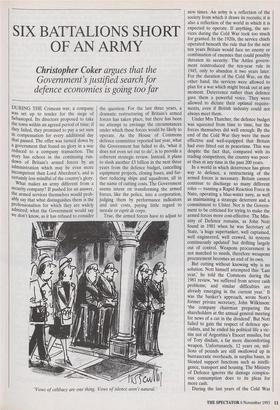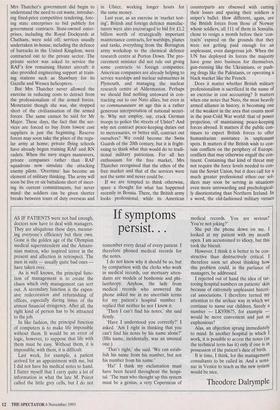SIX BATTALIONS SHORT OF AN ARMY
Christopher Coker argues that the Government's justified search for defence economies is going too far DURING THE Crimean war, a company was set up to tender for the siege of Sebastopol. Its directors proposed to take the town within an agreed period of time; if they failed, they promised to pay a set sum in compensation for every additional day that passed. The offer was turned down by a government that found no glory in a war reduced to a company transaction. The story has echoes in the continuing run- down of Britain's armed forces by an administration which may be even more Incompetent than Lord Aberdeen's, and is certainly less mindful of the country's glory.
What makes an army different from a security company? If pushed for an answer, the armed services themselves would prob- ably say that what distinguishes them is the Professionalism for which they are widely admired; what the Government would say we don't know, as it has refused to consider the question. For the last three years, a dramatic restructuring of Britain's armed forces has taken place, but there has been no attempt to envisage the circumstances under which these forces would be likely to operate. As the House of Commons defence committee reported last year, what the Government has failed to do, 'what it does not even set out to do', is to provide a coherent strategic review. Instead, it plans to slash another £3 billion in the next three years from the defence budget, cancelling equipment projects, closing bases, and fur- ther reducing ships and squadrons, all in the name of cutting costs. The Government seems intent on transforming the armed forces, like the police, into a corporation, judging them by performance indicators and unit costs, paying little regard to morale or esprit de corps.
True, the armed forces have to adjust to
'Vows of celibacy are one thing. Vows of silence aren't natural.'
new times. An army is a reflection of the society from which it draws its recruits; it is also a reflection of the world in which it is expected to operate. If anything, the ser- vices during the Cold War took too much for granted. In the 1920s, the service chiefs operated beneath the rule that for the next ten years Britain would face no enemy or combination of enemies that could possibly threaten its security. The Attlee govern- ment reintroduced the ten-year rule in 1945, only to abandon it two years later. For the duration of the Cold War, on the other hand, the services were allowed to plan for a war which might break out at any moment. Deterrence rather than defence gave them a powerful voice. They were allowed to dictate their optimal require- ments, even if British industry could not always meet them.
Under Mrs Thatcher, the defence budget was squeezed from time to time, but the forces themselves did well enough. By the end of the Cold War they were the most effective and well-equipped that Britain had ever fitted out in peacetime. This was despite the fact that, compared with its trading competitors, the country was poor- er than at any time in the past 200 years.
In a world in which deterrence has given way to defence, a restructuring of the armed forces is necessary. Britain cannot continue to discharge so many different roles — running a Rapid Reaction Force in Nato, operating a blue-water navy, as well as maintaining a strategic deterrent and a commitment to Ulster. Nor is the Govern- ment to be criticised for trying to make the armed forces more cost-effective. The Min- istry of Defence remains, as John Nott found in 1981 when he was Secretary of State, 'a huge supertanker, well captained, well engineered, well crewed, its systems continuously updated' but drifting largely out of control. Weapons procurement is not matched to needs, therefore wesapons procurement becomes an end of its own.
But cutting without knowing why is no solution. Nott himself attempted this: 'Last year,' he told the Commons during the 1981 review, 'we suffered from severe cash problems; and similar difficulties are already emerging in the current year.' It was the banker's approach, wrote Nott's former private secretary, John Wilkinson: 'the company chairman preparing the shareholders at the annual general meeting for news of a cut in the dividend'. But Nott failed to gain the respect of defence spe- cialists, and he ended his political life a vic- tim not of Argentina's Exocet missiles, but of Tory disdain, a far more discomforting weapon. Unfortunately, 12 years on, mil- lions of pounds are still swallowed up in bureaucratic overheads, in surplus bases, in bloated support functions such as intelli- gence, transport and housing. The Ministry of Defence ignores the damage conspicu- ous consumption does to its pleas for more cash.
During the last years of the Cold War Mrs Thatcher's government did begin to understand the need to cut waste, introduc- ing fixed-price competitive tendering, forc- ing state enterprises to bid publicly for government contracts. State-owned enter- prises, including the Royal Dockyards at Chatham, were sold off; services usually undertaken in-house, including the defence of barracks in the United Kingdom, were contracted out to the private sector. The private sector was asked to service the RAF's few remaining Hunter aircraft: it also provided engineering support at train- ing stations such as Shawbury for its Gazelle and Wessex helicopters.
But Mrs Thatcher never allowed the exercise in reducing costs to detract from the professionalism of the armed forces. Monetarist though she was, she stopped short of the civilianisation of the armed forces. The same cannot be said for Mr Major. These days, the fact that the ser- vices are forced to buy from lowest cost suppliers is just the beginning. Reserve forces may soon take the place of the regu- lar army at home; private flying schools have already begun training RAF and RN cadets. When the navy stages maneuvers, private companies rather than RAF squadrons now simulate the attacking enemy pilots. 'Overtime' has become an element of military thinking. The army will soon be five or six battalions short of meet- ing its current committments, but never mind: the soldiers can be given shorter breaks between tours of duty overseas and in Ulster, working longer hours for the same money.
Last year, as an exercise in 'market test- ing', British and foreign defence manufac- turers were also encouraged to bid for £1.2 billion worth of strategically important maintenance contracts, for warships, planes and tanks, everything from the Bovington army workshop to the chemical defence research centre at Porton Down. The pro- curement minister did not rule out giving some contracts to foreign companies; American companies are already helping to service warships and nuclear submarines in Plymouth, and managing the nuclear research centre at Aldermaston. Perhaps we should find nothing untoward in con- tracting out to our Nato allies, but even in so communautaire an age this is a rather generous interpretation of national securi- ty. Why not employ, say, crack German troops to police the streets of Ulster? And why not contract peace-keeping duties out to mercenaries, or better still, contract out ourselves? We could become the Swiss Guards of the 20th century, but it is fright- ening to think what that would do to tradi- tional military patriotism. For all her enthusiasm for the free market, Mrs Thatcher recognised that the ethos of the free market and that of the services were not the same and never could be.
If we are tempted to think otherwise, spare a thought for what has happened recently in Bosnia. There, the British army looks professional, while its American counterparts are obsessed with cutting their losses and sparing their soldiers a sniper's bullet. How different, again, are the British forces from those of Norway whose soldiers, all 111 of them in Somalia, chose to resign a month before their 'con- tracts' expired on the grounds that they were not getting paid enough for an unpleasant, even dangerous job. When the UN has deployed its forces the majority have gone into business for themselves, gun-running like the Ukrainians, or push- ing drugs like the Pakistanis, or operating a black market like the French.
Does it matter whether British military professionalism is sacrificed in the name of an exercise in cost accounting? It matters when one notes that Nato, the most heavily armed alliance in history, is becoming one of the weakest in the area that counts most in the post-Cold War world: that of power projection, of maintaining peace-keeping forces abroad. It matters if the public con- tinues to expect British forces to offer humanitarian assistance in unpleasant spots. It matters if the British wish to con- tain conflicts on the periphery of Europe, conflicts that may otherwise engulf the con- tinent. Containing that kind of threat may not require the force levels needed to con- tain the Soviet Union, but it does call for a much greater professional ethos: our sol- diers may soon be serving in situations even more unrewarding and psychological- ly disorientating than Northern Ireland. In a word, the old-fashioned military virtues may be in even greater demand to confront old-fashioned forces — the rage of minori- ties seeking to find their identity through conflict, the anger of nationalist movements whose voices have been suppressed.
The absence of debate on the future of the armed forces is regrettable. Instead the Government lives off past memories, just as the military establishment under Lord Raglan used to live entirely in the shadow of the Great Duke, always asking itself what Wellington would have done in the circumstances, always dreaming of the old battles against the French even when, in the Crimea, the French were our allies.
In fact, the Crimean War marked the last time Britain fielded an unprofessional army. The highest reaches of the armed forces are now beginning to suspect that the Government is willing to risk fielding such an army again, perhaps in the hope that if things were to go wrong, it could always contract out quickly to the private sector.
Christopher Coker is Reader in international relations at the London School of Eco- nomics.












































































 Previous page
Previous page